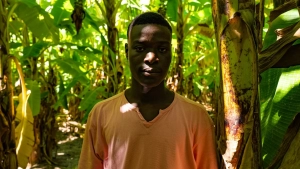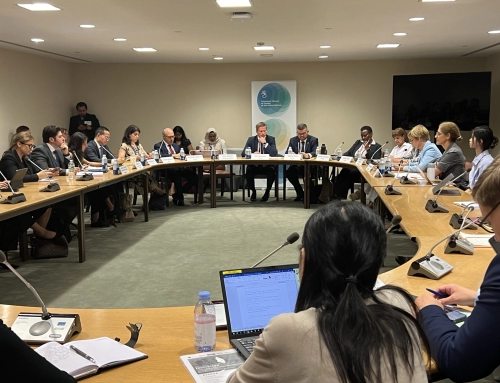By Pedro Rodriguez in Haiti

Kentonn, 21 years old, a philosophy student and part-time farmer worker, Gonaives, Haiti. ©WFP/Pedro Rodrigues
Despite the numerous challenges that have displaced over 362,000 people in Haiti, the Ministry of Education and Vocational Training and partners are responding to urgent needs including ensuring that over a million children continue to receive daily school meals and remain in school. Nearly 50 percent of Haitians are facing acute food shortages, with approximately 1.4 million people experiencing emergency levels of hunger, most of them children. Providing meals in schools can guarantee these children at least one nutritious meal per day, as well as ensuring they can remain in school and have a chance to focus on their education. It will also help protect them from risks associated with incidents of violence and lawlessness in some areas, including being recruited by armed gangs.
The security crisis is affecting local markets and movement of food, making it difficult for some schools to access some ingredients. In areas such as Artibonite valley, which is the country’s breadbasket, some armed gangs recently invaded the area and took over farmland. The Haiti Home-grown school meals programme has turned its attention to local smallholder farmers working around schools to become the main source of food supplies to ease the delivery of ingredients in schools amid security concerns. Working with partners, the Ministry of Education is building capacities of 170 farmer associations with a membership of 20,000 smallholder farmers, to produce more food varieties.
The initiative is paying off as over 50 percent of the meals provided in schools are prepared with locally sourced ingredients. Buying from farmers is also in line with Haiti’s National School Feeding Policy and Strategy promoting use of local food in the programme by 2030. Efforts are creating synergies by connecting smallholder farmers who benefit from capacity-strengthening activities to schools and other local markets, reinforcing local food systems.
Smallholder farmers such as 41-year-old Iler Cambronne, who supplies banana-plantains in his community said he is happy to be able to quickly sell his fresh produce and making a good income.
“I feel proud to be able to contribute to the programme and provide an essential service to my country, particularly with the current situation in the country. I am encouraged that my plantains are among the food eaten in schools, and to see that the children like them,” Cambronne said.
To meet the high demand, he has employed 10 people from his community to help him on his farm. “I am selling up to 50 dozen bunches of plantains each week and this is good business.” Cambronne is planning to expand his production to ensure adequate supplies throughout the year. The income Cambronne and other smallholder farmers earn is helping them meet their household needs and to pay the workers helping them on their farms.
One of the part-time workers at Cambronne’s farm is Kentonn, aged 21. He has benefitted from school meals while in primary school, and said he is happy to support efforts to buy from local farmers to ensure provision of meals in schools is not disrupted by challenges to deliver food imports. Moreover, he said, the students will eat fresh and nutritious food they are familiar with while the local farmers can create jobs for others to help them meet the demand. “It really gives me joy to see that children will be able to eat at school because this support is very important. As a student, when you are hungry, no matter how good the teacher is in their job, learning is impossible,” he said.
Haiti joined the Global School Meals Coalition in April 2022, and this inspired the Ministry of Education and Vocational Training to develop a new School Feeding Policy launched in January this year. The Policy sets an ambitious goal to achieve universal coverage, using local produce by 2030, emphasizing strengthening partnerships to deliver meals to all children.
In April this year, Haiti signed a partnership with the Inter-American Development Bank, Education Above All, and the Global Partnership for Education, totalling USD 44 million, of which USD 11.5 million will be allocated to school meals interventions targeting 30,000 children over three school years.




